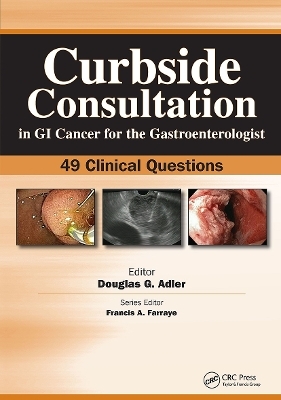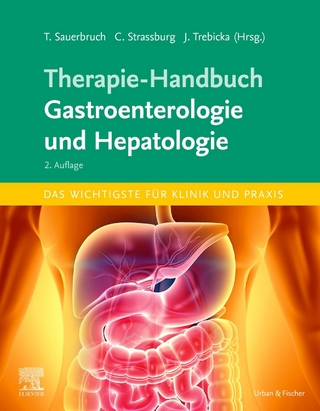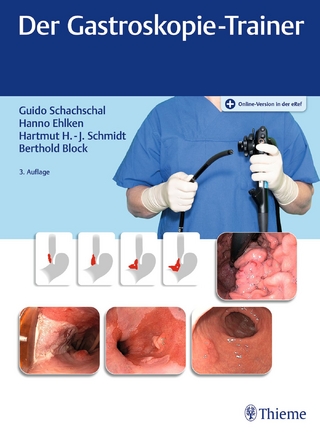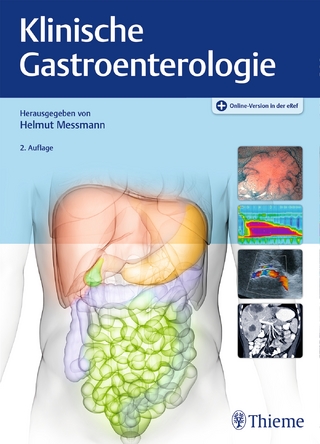
Curbside Consultation in GI Cancer for the Gastroenterologist
SLACK Incorporated (Verlag)
978-1-55642-984-2 (ISBN)
Dr. Douglas G. Adler has designed this unique reference, which offers expert advice, preferences, and opinions on tough clinical questions commonly associated with GI cancer. The unique Q&A format provides quick access to current information related to GI cancer with the simplicity of a conversation between two colleagues. Numerous images, diagrams, and references are included to enhance the text and to illustrate the treatment of GI cancer patients.
Curbside Consultation in GI Cancer for the Gastroenterologist: 49 Clinical Questions provides information basic enough for residents while also incorporating expert advice that even high-volume clinicians will appreciate. Gastroenterologists, fellows and residents in training, surgical attendings, and surgical residents will benefit from the user-friendly and casual format and the expert advice contained within.
Some of the questions that are answered:
• An 81-year-old man is found to have unresectable esophageal cancer and malignant dysphagia. Should he have a stent? A nasogastric feeding tube? A PEG tube?
• How is tumor-related bleeding from gastric cancers best approached?
• Do patients with pancreatic cancer and jaundice need to have an ERCP preoperatively?
• What is the role of ERCP and EUS in patients with suspected cholangiocarcinoma?
• Why are rectal cancers so different from colon cancers with regards to medical and surgical management?
Curbside Consultation in GI Cancer for the Gastroenterologist: 49 Clinical Questions illustrates how patients at different points in their treatment may go back and forth between specialists to receive coordination of care, and incorporates input from gastroenterologists, surgeons, radiologists, and oncologists. While providing up-to-date information, this book will help gastroenterologists to manage complex cancer-related issues and guide physicians through the maze of cancer-related treatments available.
Ideal for practicing gastroenterologists, gastroenterology fellows, surgeons, oncologists, residents, and medical students, Curbside Consultation in GI Cancer for the Gastroenterologist: 49 Clinical Questions is sure to benefit anyone caring for patients with gastrointestinal cancers.
Douglas G. Adler, MD, FACG, AGAF, FASGE received his medical degree from Cornell University Medical College. He completed his residency in internal medicine at Beth Israel Deaconess Medical Center/Harvard Medical School. Dr. Adler completed both a general GI fellowship and a therapeutic endoscopy/ERCP fellowship at Mayo Clinic in Rochester, Minnesota. He then returned to the Beth Israel Deaconess Medical Center for a fellowship in endoscopic ultrasound (EUS). Dr. Adler is currently an Associate Professor of Medicine and Director of Therapeutic Endoscopy at the University of Utah School of Medicine in Salt Lake City, Utah. Working mostly out of the School of Medicine’s Huntsman Cancer Institute, Dr. Adler’s clinical, educational, and research efforts focus on the diagnosis and management of patients with gastrointestinal cancers, with an emphasis on therapeutic endoscopy. He is the author of more than 150 scientific publications and book chapters.
Dedication Acknowledgments About the Editor Contributing Authors Preface Section I Esophagus Question 1 What Are the Risk Factors for the Development of Esophageal Cancer? Kevin D. Halsey, MD and Bruce D. Greenwald, MD Question 2 Do All Patients With Esophageal Cancer Require Surgery or Can Some Be Managed With Nonsurgical (Endoscopic, Oncologic, Etc) Methods Alone? Robin B. Mendelsohn, MD and Christopher J. DiMaio, MD Question 3 What Options Exist for Enteral Feeding in Preoperative Patients With Esophageal Cancer Who Have Dysphagia? Vivek Kaul, MD, FACG Question 4 An 81-Year-Old Man Is Found to Have Unresectable Esophageal Cancer and Malignant Dysphagia. Should He Have a Stent? A Nasogastric Feeding Tube? A Percutaneous Endoscopic Gastrostomy Tube? Katarina B. Greer, MD, MS and Ashley L. Faulx, MD, FASGE Question 5 How Should Malignant Tracheoesophageal Fistulae Be Managed in Patients With Esophageal Cancer? Ananya Das, MD, FACG, FASGE Question 6 A 55-Year-Old Man Undergoes an Esophagectomy for Esophageal Cancer. Two Years Later, He Develops Dysphagia and a Contrast Study Discloses a Narrowing at His Anastomosis. How Should This Be Investigated and Treated? &n
| Reihe/Serie | Curbside Consultation in Gastroenterology |
|---|---|
| Sprache | englisch |
| Maße | 178 x 254 mm |
| Gewicht | 698 g |
| Themenwelt | Medizinische Fachgebiete ► Innere Medizin ► Gastroenterologie |
| Medizin / Pharmazie ► Medizinische Fachgebiete ► Onkologie | |
| ISBN-10 | 1-55642-984-3 / 1556429843 |
| ISBN-13 | 978-1-55642-984-2 / 9781556429842 |
| Zustand | Neuware |
| Haben Sie eine Frage zum Produkt? |
aus dem Bereich


